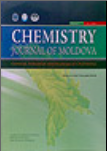Chemistry Journal of Moldova
SYNTHESIS, CRYSTAL STRUCTURE, AND SPECTRAL AND MAGNETIC PROPERTIES OF CHLORO-BRIDGED CHAIN COMPLEX OF DINUCLEAR RUTHENIUM(II,III) 3,4,5-TRIETHOXYBENZOATE
Author(s):
Field: Inorganic and coordination chemistry
Type: Research paper
Issue: 2009 Volume 4, no.1
Pages: 90-96
Hideaki Ishida, Makoto Handa, Ichiro Hiromitsu, and Masahiro Mikuriya
Field: Inorganic and coordination chemistry
Type: Research paper
Issue: 2009 Volume 4, no.1
Pages: 90-96
dinuclear ruthenium(II,III) carboxylate; magnetic property; chloro-bridged complex; polymeric complex.
Full Text (PDF): Download
DOI: dx.doi.org/10.19261/cjm.2009.04(1).06
Graphical Abstract: A chloro-bridged chain complex constructed from paddlewheel-type dinuclear ruthenium(II,III) carboxylate units, [Ru2{3,4,5-(C2H5O)3C6H2CO2}4Cl]n·1.2nC2H5OH (1·1.2nC2H5OH), was synthesized and characterized by elemental analysis and IR and UV-vis spectroscopies. The single-crystal X-ray analysis showed that the complex forms a zig-zag chain structure, in which the chloroligands bridge the dinuclear units at the axial positions with the Ru1–Cl–Ru2 angle of 120.38(7)°. A broad band around 1144 nm and a band at 475 nm were observed in the diffused reflectance spectra and ascribed to a δ→δ* and a π(RuO, Ru2)→π*(Ru2) transitions, respectively. Temperature dependence of magnetic susceptibility showed that the antiferromagnetic interaction between the dinuclear units is weak (zJ = −0.8 cm−1) with D value of 60 cm−1.
Downloads: 30






